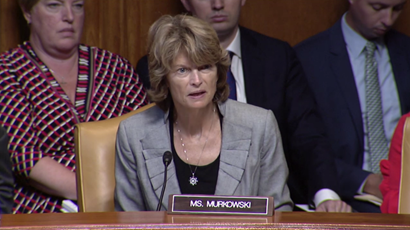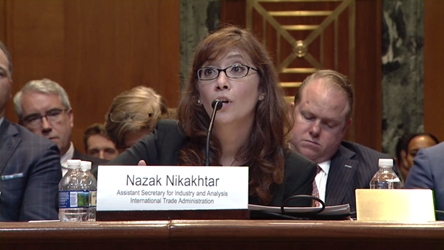Murkowski Questions International Trade Administration on Alaskan Seafood Industry Concerns
Calls for Clarification on Current Strategy
U.S. Senator Lisa Murkowski (R-AK) participated in a Commerce, Justice, and Science (CJS) Appropriations Subcommittee hearing yesterday, to review the President’s Fiscal Year 2019 (FY19) funding request for the Bureau of Industry and Security, the International Trade Administration, and the United States International Trade Commission.
Witnesses participating in the hearing included: Nazak Nikakhtar, Assistant Secretary for Industry and Analysis at the International Trade Administration (ITA); Richard Ashooh, Assistant Secretary for Export Administration at the Bureau of Industry and Security (BIS); and David S. Johanson, Chairman at the United States International Trade Commission (USITC).
During the hearing Senator Murkowski expressed some of the concerns of Alaskan stakeholders regarding the seafood industry.
Click the image above for video.
“Until recently, a positive trade relationship was developing between Alaska and China—of our salmon exports, 40% of those exports went to China. For cod, 54% of our exports went to China. In 2017, we saw roughly 1/3 of Alaska’s seafood exports end up in China, worth nearly $1 billion. So this is considerable” said Senator Murkowski. “Now, Alaskans are facing steep Chinese tariffs on these exports—a pretty significant trade barrier. This is on top of lost market share due to the Russian embargo on American seafood, which has been in place since 2014 as retaliation for sanctions, and challenging import quotas that currently exist in the EU, Japan, and South Korea.”
Murkowski went on to question Assistant Secretary Nikakhtar on the ITA’s strategy towards the retaliatory tariffs imposed on the seafood industry and barriers to seafood industry trade.
Click the image above for video.
“When we had Ambassador Lighthizer before this Subcommittee in July, he told my colleagues that a resolution to our dispute with China ‘is going to take time,’ and that China is a ‘longer term problem’ than, for example, NAFTA. The implication is that we just need to wait it out, but the seafood producers in my state are watching a trade dispute over technology transfer and cyber theft resulting in lost market access for products like salmon and cod—which isn’t an acceptable answer to them,” said Senator Murkowski. “They are not seeing that this is a winning strategy with China to just wait things out. They’re asking how long they’re going to have to endure the tariffs on their seafood exports before the administration acts to resolve rather than escalate these trade disputes … If you can share with us what the strategy is, here, in open testimony, that would be greatly appreciated.”
“If I may just quickly say, with the administration and USTR, they’re working on the China trade strategy, but we’ve always had the open channel to present good ideas to them. Which is why the Secretary has always encouraged that. And so I’m always happy to hear from industries and develop a strategy that works for them and then present it to the administration,” said Nikakhtar.










